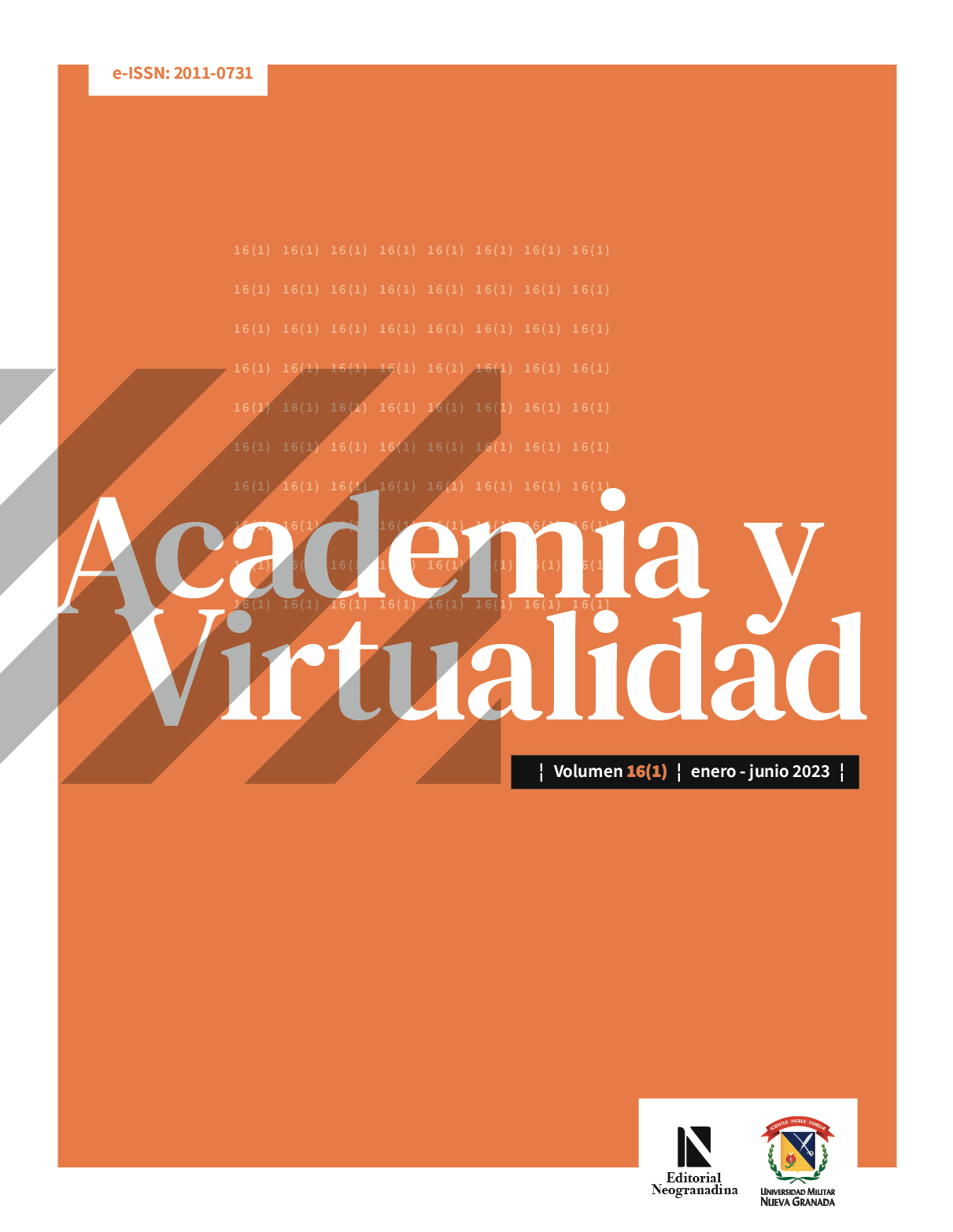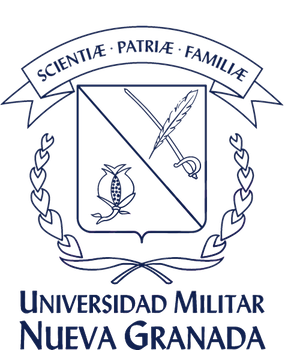Aplicación de las tecnologías de la información en las instituciones de enseñanza militar superior de Ucrania en el contexto actual
Aspectos pedagógicos y psicológicos
Resumen
Este artículo explora los aspectos pedagógicos y psicológicos de la aplicación de las tecnologías de la información y la comunicación en las instituciones de educación militar superior de Ucrania en las circunstancias actuales. Se han mostrado las direcciones prioritarias para desarrollar la educación a distancia a través de las tecnologías de la información, incluyendo la plataforma MOODLE. La investigación identificó los resultados positivos de la aplicación de las tecnologías de la información en la educación bajo restricciones de cuarentena: un aumento de la eficiencia tecnológica de la educación a distancia debido al moderno software y hardware, un mayor nivel de accesibilidad y apertura de la educación, y una mayor individualización de la instrucción. Por otro lado, reveló también las desventajas: los materiales del curso almacenados en bases de datos carecen de una estructura bien organizada y no reflejan el nivel de conocimientos preexistentes de los cadetes; no hay una retroalimentación constante por parte del instructor; debido a la incapacidad de los recursos de Internet para hacer frente a la carga de tráfico que aumenta en la pandemia, son frecuentes los fallos técnicos durante el aprendizaje a distancia; los cadetes no están totalmente preparados para trabajar de forma independiente; aumento de la carga docente de los educadores, debido a la urgente necesidad de diseñar nuevos cursos de educación a distancia; dificultades en el desarrollo de materiales de curso de alta calidad para la educación a distancia; La aplicación de la tecnología de la información a menudo impide tener en cuenta el estado mental y la psicología de los alumnos y, por lo tanto, emplear adecuadamente un enfoque individual de la enseñanza. En general, se llega a la conclusión de que la aplicación de las tecnologías de la información en la situación actual permitió preservar los parámetros básicos del proceso educativo y proporcionó herramientas eficaces para la interacción de los participantes en el proceso educativo.
Descargas
Referencias bibliográficas
Antonova, T. A. (2013). Methodical guidelines on the topic: Formation of ICT-competence of teachers. Social network of educators. Social’naya set’ rabotnikov obrazovaniya Retrieved from http://nsportal.ru.
Artabayev, Yu.Z., Oksiyuk, O.H., & Andrushchenko, V.M.,(2009). Perspective systems of distance learning for military higher educational establishments. Suchasni informatsiyni tekhnolohiyi u sferi bezpeky ta oborony,3, 45-48.
Blazhuk, O.A., & Ostrovs’ka, N. (2014). Distance education is a modern form of higher education. Naukovyy visnyk Uzhhorods’koho natsional’noho universytetu. Seriya: Pedahohika. Sotsial’na robota, 30, 28-30.
Borodavko, L., Silkin, N., Shakhmatov, A., & Chelysheva, O. (2020). Organization of Education Using Modern Distance Learning Technologies in the Context of the Covid-19 Pandemic (on the example of Russian law schools). Amazonia Investiga, 9 (33), 51-58.
Bukeikhanov, N., Gvozdkova, S., Butrimova, E. (2020). Evaluation of the effectiveness of digital teaching technologies in the context of СOVID-19. Russian regions: a look into the future, 2, 62-75. Retrieved from https://cyberleninka.ru/article/n/otsenka-ffektivnosti-tsifrovyh-tehnologiy-prepodavaniya-v-usloviyah-sovid-19
Bykov, V. Yu. (2010). Open educational environment and modern network tools of open education systems. Elektronna biblioteka NAPN Ukrainy. Kyiv. Retrieved from http://lib.iitta.gov.ua
Cao, JH, & Shen, Y. (2011). Military Professional Distance Training Based on E-Learning Technology. International conference on economic, education and management, 3, 305-308.
Chekhova, I., Berankova, J., & Zerzanova, D. (2012). E-learning technologies: military terminology course development. 18th International Conference on Knowledge-Based Organization: economic, social and administrative approaches to the knowledge-based organization, conference proceedings 2, 888-895.
Danilyan, O. G., Dzeban, A. P., Kalynovskyi, Y. Y., Kovalenko, I. I., Melyakova, J. V., Danilyan, V. O. (2020). Value determinants of the information security of a democratic state. Revista inclusions, 7 (2), 457-473.
Demyda, B., Sahaydak, S., & Kopyl, I. (2011). Distance Learning Systems: Review, Analysis, Choice. Komp»yuterni nauky ta informatsiyni tekhnolohiyi, 694, 98-107.
Dreyer, A.M. F., Dodd, N., Dalton, W. O. (2019). Applying game-based learning at the South African Military Academy: an experimental study. International journal of technology enhanced learning, 1(4), 380–397.
Getman, A., Danilyan, O., Dzeban, A., Kalinovsky, Y.,Hetman, Y. (2020). Information security in modern society: sociocultural aspects. Amazonia Investiga, 9 (25), 6-14.
Getman, A., Karasiuk, V., Getman, Y. (2020). Ontologies as a set to describe legal information. 4th International Conference on Computational Linguistics and Intelligent Systems. COLINS, Lviv, 23 April 2020 - 24 April 2020. Vol. 2604, 347-357.
Hudym, V.I., & Shunevych, B.I. (2012). The state of introduction of distance learning at the higher military school of Ukraine. Visnyk Kyyivs’koho natsional’noho universytetu imeni Tarasa Shevchenka. Viys’kovospetsial’ni nauky, 28, 41-44.
Holubnycha, L., Kostikova, I., Kravchenko, H., Simonok,V., & Serheieva, H. (2019). Cloud Computing for University Students’ Language Learning. Revista Romaneasca pentru Educatie Multidimensionala, 11(4), 55-69.
Kalynovskyi, Y., Pavlichenko, О., Serhieieva, H. (2018). Peculiarities of distance learning technologies application intraining future officers for the armed forces of Ukraine. Advanced Information Systems and Technologies: proceedings of the VI international scientific conference, Sumy, May 16–18, 2018. Sumy: Sumy State University, 72-76.
Karpa, I. (2016). Advantages of applying information and communication technology to improve the English language competence of students. Aktualni pytannia humanitarnykh nauk, issue 16, 322-327.
Kalynovs’kyi, Yu. Yu. (2021). Information technology usage in the Ukrainian HMEI under the pandemic: psychological and educational specificity. XVII mizhnarodna naukova konferentsiia Kharkivskogo natsionalnogo universytetu Povitrianykh Syl imeni Ivana Kozheduba “Novitni technologii – dlia zakhystu povitrianogo prostoru”: tezy dopovidei, 14-15 kvitnia 2021 roku. Kharkiv: KhNUPS im. I. Kozheduba, 665.
Korbut, O. (2016). On the question of the characteristics of distance education. Formation of ZVO students’foreign language socio-cultural competence: Materialy I Mizhnarodnoi naukovo-praktychnoi konferentsii. Kyiv, 22 lystopada 2011 roku. Kyiv: «Delta Korp», 61-63.
Korecki, Z. (2018). Consequences of changes in the study program to the level of knowledge of aerospace military students. International Conference Redefining Community in Intercultural Context, 7 (1), 189–192.
Koziar, M.M. (2014). Formation of competence of future specialists through ICT tools. Suchasni informatsiini tekhnolohii ta innovatsiini metodyky navchannia u pidhotovtsi fakhivtsiv: metodolohiia, teoriia, dosvid, problemy. Zbirnyk naukovykh prats, issue 40, 7-11.
Lutfullaev, G., Lutfullaev, U., Kobilova, Sh., Nematov, U. (2020). Experience of distance learning in the covid-19 pandemic. Theory and methods of professional education, 2, 66-69. Retrieved from https://usloviyahpandemii-covid-19
Mas, N. M. (2014). Managing self-study work of cadets in a distance learning environment. Zbirnyk naukovykh prats Viiskovoho instytutu Kyivskoho natsionalnoho universytetu imeni Tarasa Shevchenka, issue 47, 225-229.
Maynayev, F.Ya. (2015). Pedagogical bases of implementation of information and communication technologies in the process of teaching students of social and humanitarian profile. Pedahohika formuvannya tvorchoyi osobystosti u vyshchiy izahal’noosvitniy shkolakh, 45, 481-486.
Miller, J.W., & Tucker, J.S. (2015). Addressing and assessing critical thinking in intercultural contexts: Investigating the distance learning outcomes of military leaders. International journal of intercultural relations, 48, 120-136.
Nazar, M.M. (2013). Psychological peculiarities of distance education through the Internet. Naukovi studiyi iz sotsial’noyi ta politychnoyi psykholohiyi, 33, 124–131.
Rodrigues Santos Loureiro, N. A., Barreiros dos Santos, L. A. (2020). Use of Information and Communication Technologies in the Classroom: An Exploratory Study in Professional Military Education. Innovation Systems and Technologies, 152, 451-473.
Rodriguez, G., Camilo, C., Dussan, M., Leonardo, О. et al, (2021). Needs analysis and implementation of virtual reality technology for military training and education in Colombia. Logos ciencia & Tecnologia, Vol., 13, issue 1, 8-18.
Saavedra Alcides, C., Tolentino Emerita, Victoria V. (2018). Technology of information and communication in psychological operations in official students of the army technical school. Revista pensamiento americano, Vol. 11, issue 21, 229-236.
Salkutsana, S.M. (2017). Organization and use of distance learning technology in the Armed Forces of Ukraine. Kyiv: NUOU.
Samoliuk, N., Shvets, M. (2013). Current importance and challenges of distance learning. Nova pedahohichna dumka, 1, 193-197.
Shevchenko, O.O., & Sazonov, O.O. (2003). Distant form of training in the system of training and retraining of military specialists. Systemy obrobky informatsiyi, 2(24), 100-103.
Stasyuk, V.V. (2013). Humanization and humanitarian system of military education: the requirements of the present. Visnyk Natsional’noho universytetu oborony Ukrayiny, 1(32), 155-160.
Ulich, V.L. (2013). Humanistic aspects of military education as a basis for modeling the training of military specialists in higher education institutions. Naukovi zapysky [Nizhyns’koho derzhavnoho universytetu im. Mykoly Hoholya]. Ser.: Psykholohopedahohichni nauky, 5, 90-94.
Unhuryan, L.M., Chernets’ka, Н.V. & Naumenko, I.A (2013). Distance education of students attending the pharmaceutical faculty at a medical university. Medychna osvita, 3, 95-97.
Veremchuk, A. (2013). Problems and prospects of distance learning in universities. Problemy pidhotovky suchasnoho vchytelya, 7, 319-325.
Yunchyk, V.L. (2013). Methodical features of distance learning. Onovlennya zmistu, form ta metodiv navchannya i vykhovannya v zakladakh osvity: Zbirnyk naukovykh prats’. Naukovi zapysky Rivnens’koho derzhavnoho humanitarnoho universytetu, 7 (50), 53-57.

Derechos de autor 2022 Academia y Virtualidad

Esta obra está bajo una licencia internacional Creative Commons Atribución-NoComercial-SinDerivadas 4.0.











